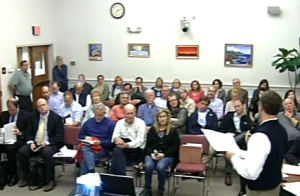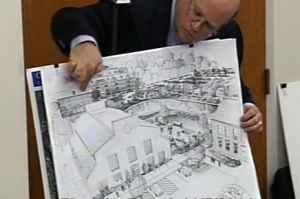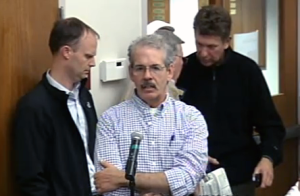Plymouth Rubber developers call off special TM
By Jay TurnerConcerned about the public’s initial reaction to their newest mixed-use redevelopment proposal, the owners of the Plymouth Rubber factory site on Revere Street have adjusted their timeline with the goal of reaching the hearts and minds of Canton voters by the annual town meeting in early May.

Dozens of residents attended the November 5 Planning Board meeting. (Click image to view CCTV coverage.)
Needing a two-thirds vote for zoning approval and realizing that they are likely nowhere near that level of support at the moment, the development team made the difficult yet calculated decision to withdraw their request for a special town meeting, which the Board of Selectmen had unanimously approved for January 26 at their request just hours earlier.
The developer’s decision came after a three-hour informal hearing hosted by the Planning Board last Wednesday that attracted dozens of residents and town officials, many of whom were critical of the project’s makeup, particularly as it relates to traffic and environmental impacts and the density of the proposed housing component.
The latest plan, as detailed by Bernie Plante of Canton Holdings LLC at Wednesday night’s informal hearing, calls for 295 residential units, including 184 conventional condominiums, 51 townhouse-style condos, and 60 age-restricted apartments (55 and older). There would also be a total of 29 moderate-income units — in accordance with the state’s affordable housing recommendations — as well as a clubhouse, swimming pool, and playground for residents.
The project also calls for 4,000 to 8,000 square feet of commercial space along Revere Street; a 10,000-square-foot private daycare/kindergarten on the portion of the property abutting Neponset Street; a pedestrian connection to the Canton Junction commuter station; and a proposed dog park on the north end of the property.
In addition, the developer has agreed to cede control of upper and lower Forge Pond and adjacent uplands. The town would also assume ownership of the historic Revere copper rolling mill and barn — which would be renovated at the developer’s expense — as well as roughly 2.2 acres of surrounding land.
The proposed project would also make use of the state’s District Improvement Financing (DIF) program to fund $6 million worth of infrastructure improvements, including the addition of traffic signals at the MBTA bridge and the Revere Street fire station and a new four-way intersection at Neponset and Norfolk streets that would serve as one of the main access points into and out of the site.
According to Lisa Dickinson of UniBank, which serves as the town’s financial advisor, the infrastructure upgrades would be financed through the sale of bonds and ultimately would be paid for using the additional tax revenue generated by the development. She said the DIF program has only been used a handful of times in Massachusetts but does have its benefits, namely that public improvements can be achieved without levying new taxes.
Also during the presentation, Paul Schneiders, attorney for the developer, highlighted three major changes that the newest proposal incorporates: the construction of a bridge over a diversion channel that will allow for a road to be built connecting Revere and Neponset streets; a substantial reduction in the number of proposed housing units; and a marked increase in the number of for-sale units as opposed to rentals.

The developers presented a conceptual sketch of a renovated Revere copper rolling mill and barn. (CCTV image)
“We’re not just coming in every single year with the same old thing,” Schneiders said, referencing past failed attempts in 2007, 2011 and 2013. “Each year we’re learning and trying to make it better, and those are three major, major changes.”
However, despite their best efforts to sell the public on the benefits of the new proposal, the majority of speakers still had questions and concerns.
Among the more outspoken critics was Planning Board member Chris Connolly, who said he was flat-out opposed to the plan despite it being the best one he’d seen in his eight years on the board.
“Every parent I talk to at sporting events and school functions, they’re all adamant that the town doesn’t need any more condominiums or any more apartments,” Connolly said. “The town is built out. Traffic is a nightmare, Dedham street is a nightmare, getting through the center of town is a nightmare. I don’t know why, as a town, we’re going to go pass a rezoning that we don’t have to do to allow 295 more units there when there are other options.”
Others took to the podium and echoed Connolly’s concerns, including Jerry Devine of Reynolds Street, who advocated for fewer residences and cited the need for a larger commercial component.
“The center of town is pizza shops and nail salons,” Devine said. “You need some real business in the area to draw people in.”
In response to those who preferred a commercial option, representatives of the developer reminded the audience that they had aggressively pursued such uses and still have that option as of right; however, they stressed that commercial development would generate less tax revenue but considerably more traffic.
Plante added that a major grocer had expressed interest in the site, but they could not find a way to make it work.
“It would be in our best interests to deal with two or three or four or a dozen commercial or industrial tenants on that piece of property without having to deal with all of the infrastructure and all of the DIF improvements than dealing with 295 homeowners and residents that would live there,” he said. “It’s a much simpler deal for us … and we would prefer to do it.”
Another major concern expressed by residents and town officials involved the contamination of the property after centuries of industrial uses and the developer’s plan for remediation, which consists of soil removal, ongoing monitoring of Factory Pond, and a cap on a vacant portion of the site where the age-restricted apartments would be built.
A few speakers, including Richard Mansfield, said the developer’s $5 million remediation plan would barely make a dent in the environmental cleanup that is needed at the site. Mansfield, who worked at Plymouth Rubber in the 1970s and has also extensively studied the site as an environmental engineer, said the vacant land alone is “grossly contaminated, extremely hot, and leeching through its side into the pond.”
“I only speak as a father and a citizen here now, and that’s why I would like us to consider as much as possible to get that site as clean as possible,” said Mansfield. “I want to see these guys be able to develop it. I think it’s much better for all of us, but before that I believe we need to have it cleaned up.”
Despite the various concerns and criticisms, a few residents who spoke up were strongly in favor of the proposal, including Helen McHowell, a downtown business owner who called it a “wonderful plan” and referenced the mixed-use project at Forge Pond as an example of what the site could become.
Alan Leary, a veteran of town government who now serves on the condo board at nearby Paul Revere Village, also offered his support for the project, while noting that condominiums tend to get a “bum rap” that is mostly undeserved.
“We’re not going to get a perfect solution, but the one factor that remains is that you’ve got to satisfy the people and you’ve got to satisfy the developer,” Leary said. “Hopefully we can meet them in the middle and get this thing done.”
Others speakers, like Anthony Braconi, agreed that a residential use was appropriate but questioned the size and scope of the proposal while sharply criticizing the cleanup plan. Braconi in particular was also vehemently opposed to a special town meeting, and he agreed with Connolly’s characterization of the development negotiations as “black ops” and lacking in public participation.
However, Planning Board Chairman Jeremy Comeau, who had called the meeting specifically as a way to inform the community about the development plan, took issue with that phrase while noting that it was the job of public officials to “contribute ideas as well as vet the proposal while discussions took place.”
Comeau also felt it would be “irresponsible and careless” for him as a Planning Board member to take a position on the development before a formal hearing has been convened. “This is why I will continue to seek information pertaining to this project, not only from experts but also from the citizens of the town throughout the public hearing process,” he said. “I would encourage my colleagues to do the same.”
As for Canton Holdings’ decision to go forward with last week’s meeting, they acknowledged in hindsight that the project was not quite ready but agreed with Comeau that it was the right time to go public with it.
“It was a balancing [act],” said Schneiders at the meeting. “We’re not quite ready, but we wanted to get it out into the open, and I think all of these questions are good.”
Visit the town of Canton website to access Plymouth Rubber redevelopment documents.
Short URL: https://www.thecantoncitizen.com/?p=27534











